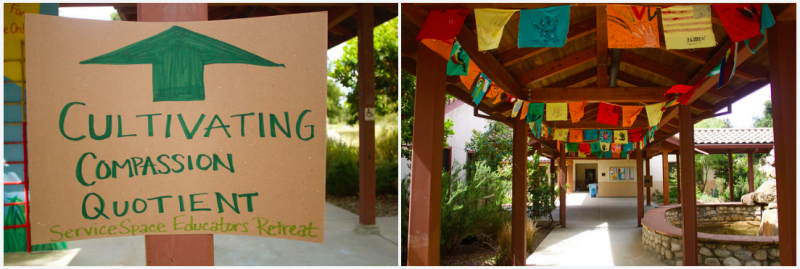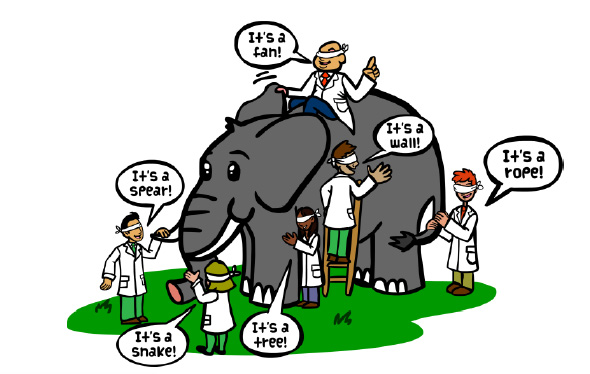Cultivating Compassion Quotient At Mount Madonna
.jpg)
Last December, a group of us circled up at a tea shop in Berkeley, to share stories and perspectives on transformation in education. Among various online and offline ripples, five months later, we circled up again, this time for a day-long retreat at Ward's Mount Madonna School.
On Saturday, 40 educators from various walks of life and corners of Northern CA—from classroom teachers to Peace Corps volunteers to researchers, college professors, social entrepreneurs, grassroots giftivists and storytellers—gathered atop the sanctuary of Mount Madonna—a sacred retreat center whose decades of cultivation and selfless service (inspired by a silent monk) stilled our hearts as soon as we entered the gate.
The theme of the day was Cultivating Compassion Quotient:
What is Compassion Quotient (CQ)? Lot of today's dominant paradigm is optimized for intellectual quotient (IQ) -- and we have many standardized tests to measure it. In recent years, we've seen the rise of emotional quotient (EQ), that is defined as an individual's capacity to engage with one's emotions and empathize with another's. However, we'd like propose a third metric to broaden the conversation: compassion quotient (CQ), which is one's capacity to act in service even when it may not offer any immediate or visible benefit. For instance, when Julio Diaz get robbed of his wallet and pro-actively offers his jacket to the robber, it is an expression of his compassion quotient. More: Compassion as a Basic Global Ethic
How Can We Amplify CQ? Gandhi offered a trilogy of "hands, head and heart" and suggested that we, as individuals and cultures, should first align those elements and ultimately learn to lead with the heart. Today, we have many vocational schools that amplify the work of hands, many think-tanks that operate with IQ of the head, but we have very limited frameworks to amplify CQ. Perhaps that is because compassion's effect is distributed -- in time and space -- and hence hard to quantify and monetize? ServiceSpace ecosystem is holding this question in various circles, and supporting many experiments to generate a cultural dialogue around it. More: Generosity Entrepreneurship


We kicked things off with silent meditation, and a circle of sharing around the room. In such a space of attentive listening, each share shined as a gem. Powerful stories were offered, and deep questions asked.
Prasad captured our hearts with a lesson from his 4-year-old daughter who consoled him on the power of a genuine intention when he was disappointedly turned away from donating blood. Anne offered full-of-heart stories of her latest inspirations with a kindness circle at SF Waldorf High School. As we closed out the circle, Zilong noted 3 core themes that emerged:
 1. Not Knowing. Or as Ward calls it, WONK: Wisdom Of Not Knowing. “True learning is unpredictable,” he remarked. Prof. Shariq zoomed us out to the 13+ billion year-old miracle of this very instance in time. Afreen shared how inspired she was to witness students coming to their own conclusions through a recent classroom Socratic dialogue. Prasad noted that he’s given up the idea that “I have something to teach.” And Shriram humorously pointed out the “cloud of anxiety” that can form from a question like “What’s next for you?” or “What are you going to do?”
1. Not Knowing. Or as Ward calls it, WONK: Wisdom Of Not Knowing. “True learning is unpredictable,” he remarked. Prof. Shariq zoomed us out to the 13+ billion year-old miracle of this very instance in time. Afreen shared how inspired she was to witness students coming to their own conclusions through a recent classroom Socratic dialogue. Prasad noted that he’s given up the idea that “I have something to teach.” And Shriram humorously pointed out the “cloud of anxiety” that can form from a question like “What’s next for you?” or “What are you going to do?”2. Make Mistakes. “I wish I was allowed to make mistakes,” one of Ward’s students once admitted. Similarly, Bela noted how safe spaces for sharing nurture her to operate from her heart rather than head, and Kara accented the need to teach and learn how to be, rather than how to achieve.
 3. Creating Container/Context for Learning is Key. "As a teacher, am I asking the right questions?" Morgan wondered. Then, Mary pointed out the onset of youth depression and bullying. I noted that while 3 times more Americans have bachelors degrees compared to just 2 generations ago, only a third of Americans today consider themselves happy. How do we learn to live with joy, meaning, and fulfillment? "What does it take for students to want to run into the classroom, rather than running out of it as soon as the bell rings?" Nipun posed. And as a school administrator, Vinya reflected on "How to step out of the mechanization, and stay grounded to why we got into this work to begin with?"
3. Creating Container/Context for Learning is Key. "As a teacher, am I asking the right questions?" Morgan wondered. Then, Mary pointed out the onset of youth depression and bullying. I noted that while 3 times more Americans have bachelors degrees compared to just 2 generations ago, only a third of Americans today consider themselves happy. How do we learn to live with joy, meaning, and fulfillment? "What does it take for students to want to run into the classroom, rather than running out of it as soon as the bell rings?" Nipun posed. And as a school administrator, Vinya reflected on "How to step out of the mechanization, and stay grounded to why we got into this work to begin with?"As we circled around the room, the qualities of gratitude, companionship, and humility were palpable.

Min laughingly offered how it’s nice to know “I’m not crazy” in wanting to draw out these deeper values, as Anuj cited the parable of the blind men and elephant—how each blind man encounters a different part of the elephant, and so defines the elephant from its partial perspective. Scott made a metaphor of the ripples from a stone dropped in water—how the stone and water don’t necessarily know what they are doing, they’re just according to their laws of nature.
As the morning melted into midday, we found ourselves buoyed by the collective wisdom, and our hearts beamed open with a deeper sense of conviction in CQ, spilling over into small conversations as we traversed down the hill and into lunch. As we filled our plates with a nourishing lunch of stew, salad, veggies, grains, and muffins cooked entirely by residents and volunteers, breathtaking views of the valley and towering redwood trees reminded us of the natural rhythms that underlie all of our efforts.

After lunch, we had the gift of learning more about Mount Madonna and Ward’s lessons from the silent monk, Baba Hari Dass, who inspired it all. He and his wife Kranti, have been with the space over decades of evolution. In 1978, Ward had quite literally laid the foundations, brick by brick, for the values-based school in which we were spending the day, and which—now equipped with vibrant facilities, from a music room filled with instruments, volleyball court courtyard, bright classrooms and picnic tables—initially began on top of a cement carport, where a small group of multiple grade-levels were taught simultaneously.
Among the many stories shared, several folks were moved by an instance with a box of screws.Zilong recounts:
 "Ward shared that Baba Hari Dass always did the work with everyone else, sorting stones, laying bricks, rain or shine.
"Ward shared that Baba Hari Dass always did the work with everyone else, sorting stones, laying bricks, rain or shine.One time, the silent monk was seriously ill -- he couldn't even stand up. But he insisted to do whatever smallest thing he could. So he sorted out a box of mixed nails while laying down. Ward thought that the act was silly and pointless, given that the construction team buys matching screws in bulk.
But a day or so later, Ward overheard the construction crew saying, "Man, if it were not for the little monk sorting out the mixed screws, we would not have been able to finish the job because we had run out of matching screws."
We then flowed into a video and discussion on how to design for deeper learning. After watching A Letter from Your 14-Year-Old Self, we wondered, “What ‘technologies’ or designs help us reconnect with the human qualities of compassion and generosity, service and wisdom? How do we design spaces in the classroom that help guide students (and ourselves) towards a meaningful life?”
Arathi remembered a memory of from when she was in high school—how one teacher kept an open invitation for every student to have breakfast on Fridays at a local restaurant. One week, Arathi and another teacher were the only people who showed up, and she spend the two hours of breakfast connecting with these teachers, who asked her about her interests, aspirations, and everything in-between. The quality of attention and concern for her wellbeing left a deep impression on her.



As the sun dipped towards 2:30PM, we transitioned into a breakout session with various folks anchoring small circles on key themes and CQ. Min held a circle on money/teaching financial literacy + CQ. Prof. Shariq and Anne held one on dialogue and kindness circles, while Prasad and Ami dived into the nuances of Unlearning + CQ. Lalita and Afreen found a shady picnic table for at-risk youth + CQ while Aditi and Ward sat by the courtyard and delved into compassion quotient from learning journeys abroad.
 After the breakouts, conversations were bubbling over and Bob, who teaches at Mount Madonna School, captured our attention with his soulful accordion tunes. As the day faded into evening, reflections were shared around the circle, and we closed with a prayer and silent gratitude. Folks self-organized in cleanup, and then, one-by-one, we found ourselves in a post-retreat circle, expressing and exploring ways to bring the spirit of the day forward in our own contexts, schools, organizations and communities.
After the breakouts, conversations were bubbling over and Bob, who teaches at Mount Madonna School, captured our attention with his soulful accordion tunes. As the day faded into evening, reflections were shared around the circle, and we closed with a prayer and silent gratitude. Folks self-organized in cleanup, and then, one-by-one, we found ourselves in a post-retreat circle, expressing and exploring ways to bring the spirit of the day forward in our own contexts, schools, organizations and communities.As the last cushions were put away, cords rolled up, and decorations packed, I couldn’t help but feel a wave of gratitude, for all that can transpire in a single day. On top of the genuine presence and themes, labor-of-love gifts of all forms and from all directions filled the air with a sense of abundance.
From Anne's beautiful handmade gratitude cards to Nilam Aunty’s ceramic key chains (hand delivered by her son, Shriram!), Tejas’ illuminating photos, Bela's ambiance supplies, Zilong filling in all the gaps, Kranti's delicious cooking, Anuj's audio work, Bob's accordion tunes, Haley's artful green arrows and dedicated setup, and Ward’s gracious gift of the space, Baba Hari Dass and all the community of cultivators whose vibrations blessed our day, and so much more— it’s amazing to see how much can emerge from a simple intention to be of service while transforming ourselves along the way. :)
Here are Tejas' shining photos from the day:
Posted by Audrey Lin on Jun 1, 2015
SHARE YOUR REFLECTION
5 Past Reflections


On Jun 3, 2015 Nipun Mehta wrote:

On Jun 3, 2015 Mary Roscoe wrote:




On Jun 2, 2015 Trushna wrote:
Post Your Reply